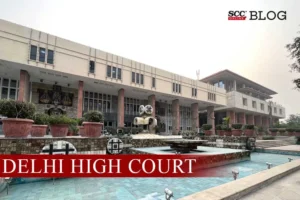Delhi High Court: In a petition challenging the impugned order dated 22-11-2022, passed by Additional Sessions Judge, Patiala House Courts, New Delhi (‘the Sessions Court’), Amit Bansal, J.*, opined that when a case was committed by the Court of Magistrate to the Court of Session, the Magistrate would become functus officio and any evidence recorded therein could not be held admissible for the purposes of a de novo trial before the committal Court. Therefore, the evidence would also have to be recorded de novo. Thus, the Court set aside the impugned order dated 22-12-2022 and directed that the trial should proceed before the Sessions Court from the stage it was before the impugned order was passed.
Background
In an instant case, Respondent 2 filed an FIR dated 17-06-2003 under Sections 341, 323, 308, 506 and 34 of the Penal Code, 1860 (‘IPC’). After completion of an investigation, charge-sheet was filed on 31-12-2003. Thereafter, the Metropolitan Magistrate (‘MM’) vide order on charge dated 16-04-2005, framed charges for the offences under Sections 341, 323, 308, 506 and 34 of the IPC, which were all triable by the Court of Magistrate.
Subsequently, Respondent 2 filed an application under Section 323 of the Criminal Procedure Code, 1973 (‘CrPC’) seeking committal of the case to the Court of Session on the ground that the accused persons were also liable to be prosecuted under Section 307 of the IPC, which was exclusively triable by the Court of Session. However, the MM dismissed the application vide order dated 04-07-2014. Thereafter, Respondent 2 filed a revision petition and the MM vide order dated 15-10-2015, committed the case to the Sessions Court.
The trial commenced before the Sessions Court and accordingly, witnesses were examined, cross-examined and discharged. Subsequently, vide order dated 22-11-2022, the Sessions Court ordered that a fresh de novo trial was not to be started, especially when all the witnesses had been examined by the MM.
Thus, the petitioner filed the present petition to challenge the order dated 22-11-2022.
Analysis, Law, and Decision
The Court relied on Sudhir v. State of M.P., (2001) 2 SCC 688 and Mahmood Hasan v. State of Haryana, 2019 SCC OnLine P&H 7637, and opined that the mandate of Section 323 of the CrPC was clear and when a case was committed by the Magistrate to the Court of Session, the trial would had to begin de novo. The Court opined that the Court of Session would first frame charges and then proceed with the examination of the witnesses.
The Court opined that Section 326 of the CrPC covered cases wherein a Magistrate had been succeeded by another Magistrate and such successor could act on the evidence recorded by his predecessor. The Court opined that Section 326 of the CrPC would not be applicable to the present case as the Sessions Court could not be treated as the successor of the Magistrate. The Court opined that when a case was committed by the Court of Magistrate to the Court of Session, the Magistrate would become functus officio and any evidence recorded therein could not be held admissible for the purposes of a de novo trial before the committal Court. Therefore, the evidence would also have to be recorded de novo.
Thus, the Court set aside the impugned order dated 22-12-2022 and directed that the trial should proceed before the Sessions Court from the stage it was before the impugned order was passed. However, the Court requested the Sessions Court to expeditiously complete the trial in the present case, within a period of six months from the date fixed.
[Shankar v. State (NCT of Delhi), 2023 SCC OnLine Del 7837, decided on 05-12-2023]
*Judgment authored by- Justice Amit Bansal
Advocates who appeared in this case :
For the Petitioner: Rajat Wadhwa, Dhreti Bhatia and Gurpreet Singh Gill, Advocates;
For the Respondents: Shoaib Haider, APP for State, Rachna Jaiswal, Akshay Kumar and Sandeep Nain, Advocates; SI Jitender Singh, PS Inderpuri.

